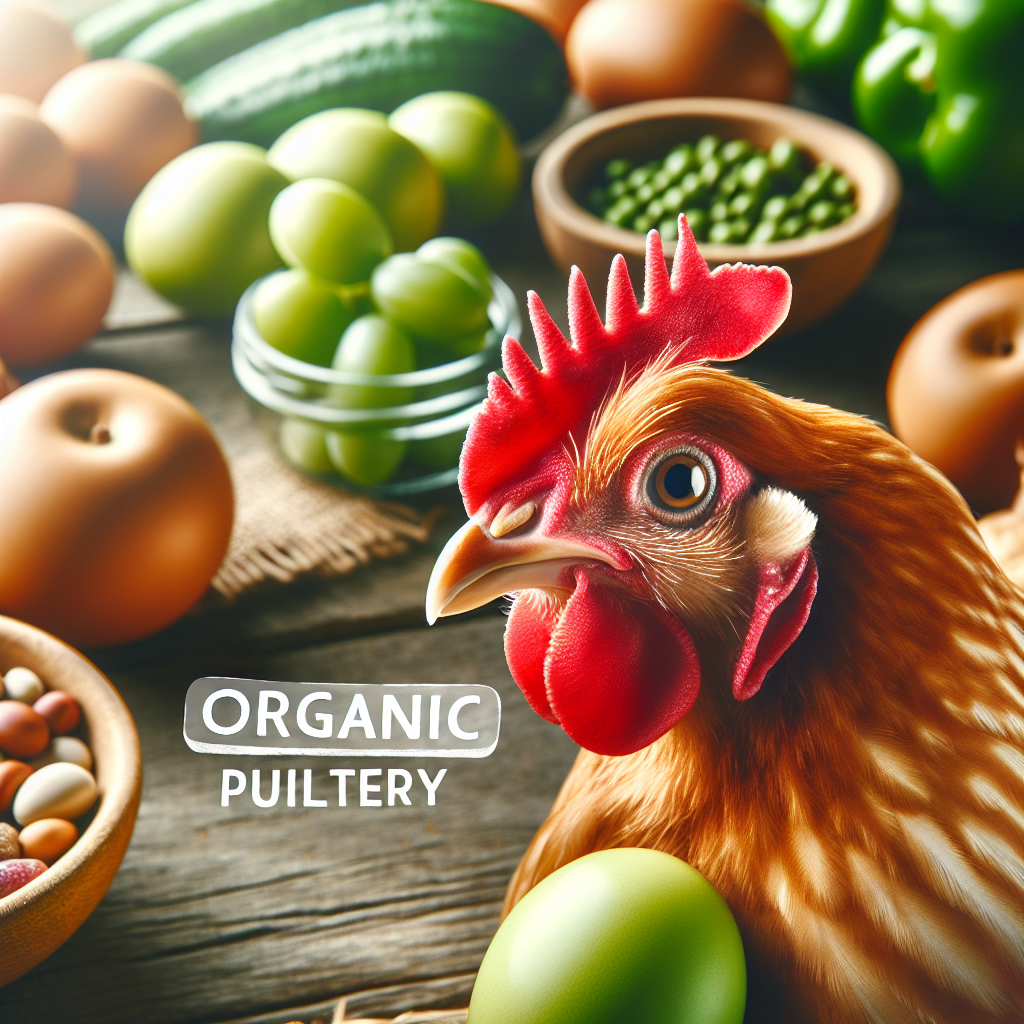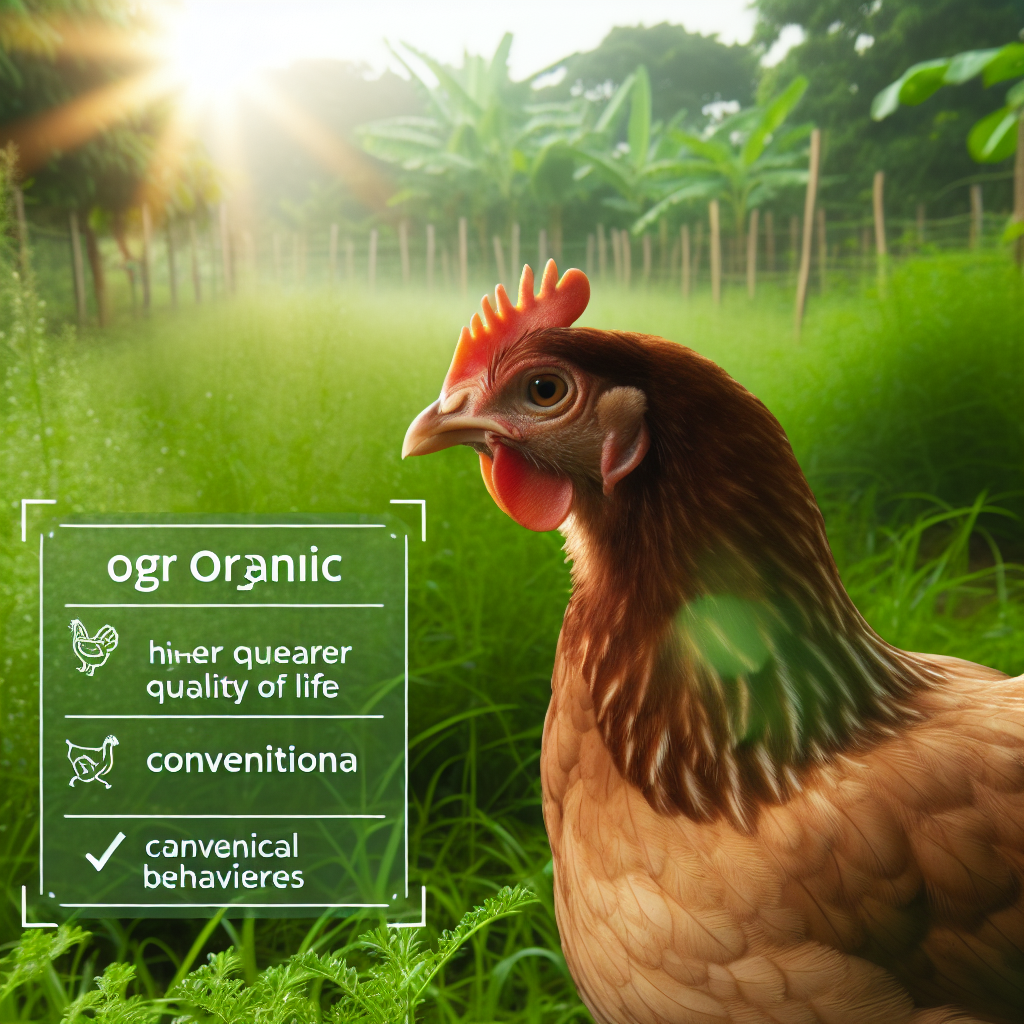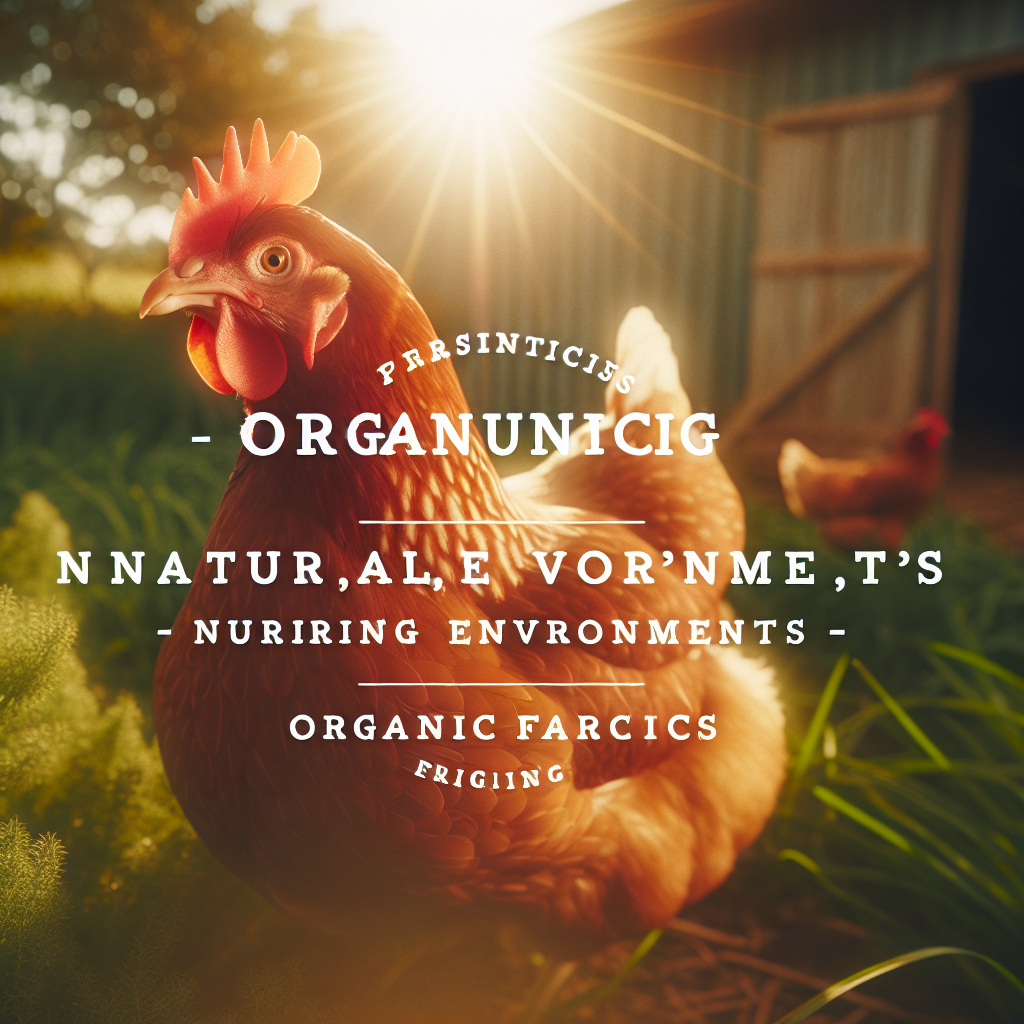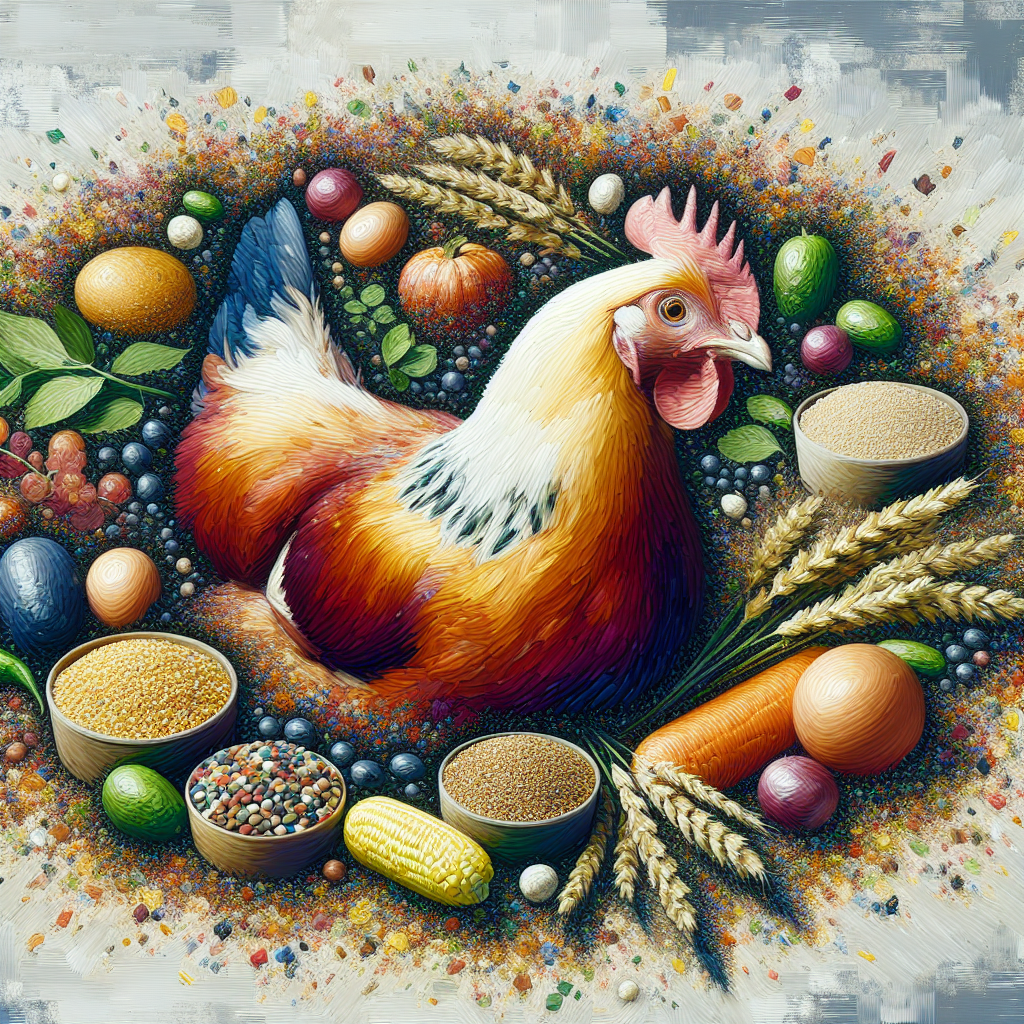Embarking on your organic poultry farming journey can be an exciting and rewarding experience, filled with the promise of sustainable and healthy farming practices. But where do you turn to for guidance and support? Fortunately, there are numerous resources and organizations available to provide the knowledge, expertise, and network you need to thrive in this specialized field. From educational materials and online forums to local agricultural associations and government initiatives, a wealth of information awaits to assist you on your path to success in organic poultry farming. The key is to tap into these invaluable resources that can empower you to make informed decisions, address challenges, and ultimately create a thriving and ethical farming operation.
Government Agencies
Department of Agriculture
The Department of Agriculture is a key government agency that can provide valuable resources and support for your organic poultry farming journey. They are responsible for overseeing and regulating agriculture policies and programs in the United States, including organic farming practices. The Department of Agriculture offers a wide range of services and information for poultry farmers, including assistance with organic certification, grants and loans for organic farming initiatives, and access to research and educational resources.
Environmental Protection Agency
The Environmental Protection Agency (EPA) plays a crucial role in ensuring the sustainability and environmental impact of agricultural practices, including organic poultry farming. The EPA provides guidelines and regulations for the use of pesticides and other chemicals in agriculture, ensuring that organic farmers adhere to strict standards to protect the environment and consumers. Additionally, the EPA offers resources and educational materials on sustainable and environmentally friendly farming practices, which can greatly benefit organic poultry farmers.
Food and Drug Administration
The Food and Drug Administration (FDA) is responsible for regulating the safety of food and drugs in the United States, including poultry products. While organic certification primarily falls under the authority of the Department of Agriculture, the FDA plays a significant role in ensuring the safety and quality of organic poultry products. They provide guidelines and regulations regarding the labeling and production of organic poultry products, ensuring that consumers receive accurate information and that organic farmers meet the necessary standards.
Certification Bodies
USDA Organic Certification
The USDA Organic Certification is the most recognized and widely respected certification program for organic farming in the United States. To obtain USDA Organic Certification for your poultry farm, you must meet specific requirements outlined by the Department of Agriculture. These requirements include adhering to organic farming practices, such as using organic feed, providing access to outdoor areas, and avoiding the use of synthetic pesticides and antibiotics. USDA Organic Certification not only assures consumers that your poultry products are organic but also opens up new marketing opportunities and partnerships.
Certified Humane
Certified Humane is a certification organization that focuses on animal welfare standards. While it is not specifically for organic farming, becoming certified by Certified Humane can be an excellent addition to your organic poultry farm. Their standards ensure that animals are treated humanely and have access to proper living conditions, such as adequate space and natural light. By meeting Certified Humane standards, you can demonstrate your commitment to animal welfare and ethical farming practices, which can resonate with consumers who prioritize these values.
Global Animal Partnership
The Global Animal Partnership (GAP) is a nonprofit organization dedicated to improving the welfare of farm animals. They provide a tiered certification program, ranging from Step 1 to Step 5+, which signifies different levels of animal welfare practices. By achieving GAP certification, you can show consumers that your poultry farm meets their rigorous standards for animal welfare. While this certification is not specifically focused on organic farming, it aligns well with the principles of organic agriculture, highlighting your commitment to sustainable and ethical poultry farming.
Industry Associations
National Sustainable Agriculture Coalition
The National Sustainable Agriculture Coalition (NSAC) is an alliance of grassroots organizations that advocate for federal policies supporting sustainable and organic agriculture. Joining NSAC can offer numerous benefits for your organic poultry farm, including access to policy updates, funding opportunities, and networking with like-minded farmers and organizations. NSAC also provides educational resources and training programs to help farmers navigate the complex world of government policies and programs, ensuring that your organic poultry farm can thrive within a supportive network.
Organic Trade Association
The Organic Trade Association (OTA) is a membership-based organization that represents the organic industry in the United States. By joining OTA, you gain access to a vast network of organic farmers, business owners, and industry experts, allowing you to stay informed about the latest trends and developments in organic poultry farming. OTA offers resources and educational materials on organic farming practices, marketing strategies, and policy advocacy. They also organize events and trade shows where you can showcase your organic poultry products and connect with potential buyers and partners.
American Poultry Association
The American Poultry Association (APA) is an organization that promotes the exhibition and breeding of standard-bred poultry. While not specifically focused on organic farming, joining APA can offer valuable resources and support for your poultry farm. APA provides educational materials on poultry breeding, health, and husbandry, aiding you in maintaining healthy flocks and achieving genetic diversity. They also organize poultry shows and exhibitions, where you can showcase your organic poultry breeds and connect with fellow poultry enthusiasts for knowledge sharing and networking opportunities.
Educational Resources
University Extension Programs
University extension programs, typically offered by agricultural colleges and universities, provide educational resources and expertise to farmers. These programs often offer workshops, courses, and online resources specifically tailored to organic farming practices. The extension personnel can provide guidance on best practices for organic poultry farming, including nutrition, disease prevention, and farm management. Collaborating with university extension programs can help you stay updated on the latest research and advancements in organic agriculture, ensuring that your farm remains at the forefront of sustainable and efficient practices.
Online Courses and Webinars
In recent years, there has been a surge in online courses and webinars focused on organic poultry farming. These educational resources allow you to learn at your own pace and from the convenience of your farm. Online platforms offer a range of topics, from the basics of organic poultry farming to specialized courses on nutrition, marketing, and farm business management. Many platforms also provide access to industry experts who can answer your questions and provide personalized guidance. By enrolling in online courses and webinars, you can continually expand your knowledge and skills, enhancing the success of your organic poultry farm.
Farm Workshops and Conferences
Attending farm workshops and conferences is an excellent way to learn from experienced farmers, industry experts, and researchers in the field of organic poultry farming. These events provide opportunities for networking, knowledge sharing, and hands-on learning. Workshops often cover various aspects of poultry farming, including breed selection, flock management, disease prevention, and marketing strategies. Additionally, conferences feature keynote speakers, panel discussions, and breakout sessions on cutting-edge trends and challenges in organic agriculture. Participating in farm workshops and conferences allows you to deepen your understanding of organic poultry farming and connect with a supportive community for ongoing support and guidance.
Agricultural Cooperatives
Local Poultry Farmers’ Cooperative
Joining a local poultry farmers’ cooperative can be highly beneficial for your organic poultry farm, as it allows you to collaborate and pool resources with other farmers in your area. Cooperatives often provide shared marketing, purchasing, and distribution services, helping you reach a wider customer base and negotiate favorable prices for inputs. They may also offer educational programs, workshops, and access to specialized equipment and facilities. By becoming a member of a local poultry farmers’ cooperative, you can tap into a supportive community, share knowledge and experiences, and collectively work towards the success and growth of organic poultry farming in your region.
Organic Farming Cooperative
If you are specifically interested in organic farming practices, joining an organic farming cooperative can provide targeted support and guidance for your poultry farm. Organic farming cooperatives focus on promoting and supporting organic agriculture in their communities. They often offer assistance with organic certification processes, access to marketing channels for organic products, and resources on organic farming practices. By collaborating with an organic farming cooperative, you can learn from experienced organic farmers, access workshops and training programs, and establish connections with buyers and consumers who prioritize organic products.
National Agricultural Cooperative Marketing Association
The National Agricultural Cooperative Marketing Association (NACMA) is an organization that promotes and supports agricultural cooperatives across the United States. By joining NACMA, you can gain access to resources and expertise in cooperative business management, marketing strategies, and industry trends. NACMA offers training programs, conferences, and networking opportunities that can greatly benefit your organic poultry farm. They also advocate for the interests of agricultural cooperatives at the national level, ensuring that your voice and concerns are heard in policy deliberations and decision-making processes.
Non-Profit Organizations
Organic Farming Research Foundation
The Organic Farming Research Foundation (OFRF) is a nonprofit organization dedicated to advancing organic agriculture through research and education. By supporting OFRF, you contribute to the ongoing development of scientific knowledge and innovation in organic poultry farming. OFRF funds research projects focused on organic farming practices, crop and livestock management, and sustainable agriculture systems. They also provide educational resources, including publications and webinars, that cover a wide range of topics relevant to organic poultry farming. Partnering with OFRF can assist you in staying up-to-date with the latest research findings and adopting evidence-based practices on your farm.
Rodale Institute
Rodale Institute is a nonprofit organization that conducts research and provides resources on organic farming practices. Their research focuses on soil health, crop rotation, regenerative agriculture, and sustainability. Rodale Institute offers educational materials, workshops, and on-farm training programs to help farmers transition to organic practices and improve the viability of organic farming systems. By engaging with Rodale Institute, you can benefit from their expertise and experience in organic farming, access valuable resources, and contribute to the advancement of organic poultry farming on a larger scale.
The Cornucopia Institute
The Cornucopia Institute is a nonprofit organization that promotes ecological, organic, and sustainable agriculture. They provide resources and advocacy for small-scale organic farmers, ensuring fair and ethical practices in the organic industry. The Cornucopia Institute offers educational materials, scorecards that rate organic brands and products, and a range of resources on organic farming practices. By partnering with The Cornucopia Institute, you can gain valuable insights into the organic market, network with other organic farmers, and stay informed about issues and developments affecting the organic poultry farming community.
Business Development Services
Small Business Administration
The Small Business Administration (SBA) offers a wide range of services and resources to support small businesses, including organic poultry farms. They provide guidance on business planning, financing options, and obtaining necessary licenses and permits. The SBA offers workshops, training programs, and online resources specifically tailored to the needs of small agricultural businesses, helping you develop a solid business foundation. They also administer loan and grant programs that can provide financial assistance for organic farming initiatives. By leveraging the services and resources of the SBA, you can enhance the sustainability and growth of your organic poultry farm.
SCORE Mentoring
SCORE Mentoring is a nonprofit organization that provides free mentorship and counseling services to small businesses. SCORE volunteers are experienced business professionals who can offer guidance in various areas, such as business planning, marketing strategies, and financial management. Engaging with a SCORE mentor can be incredibly valuable for your organic poultry farm, as they can help you navigate the intricacies of running a successful business. Whether you need assistance with market research, creating a business plan, or improving profitability, SCORE mentors can provide personalized advice and support tailored to your specific needs.
Local Business Incubators
Local business incubators are organizations or programs that provide resources, support, and mentoring to new and emerging businesses. By joining a local business incubator, you gain access to expertise, networking opportunities, and shared facilities that can accelerate the growth of your organic poultry farm. Incubators often offer access to business coaching, workshops, and networking events, allowing you to refine your business strategies and connect with potential partners and investors. They may also provide access to shared production facilities or co-working spaces, reducing startup costs and providing a supportive environment to kickstart your organic poultry farming journey.
Veterinarians and Animal Health Professionals
Avian Veterinarians
Avian veterinarians specialize in the health and well-being of birds, including poultry. A trusted avian veterinarian can be an invaluable resource for your organic poultry farm, as they can provide expert guidance on disease prevention, vaccination protocols, and overall flock health management. Avian veterinarians can conduct health assessments, diagnose and treat poultry illnesses or injuries, and offer recommendations on nutrition and biosecurity. Regular consultations with an avian veterinarian can help you maintain a healthy and thriving flock, ensuring that your organic poultry farm operates at its highest standards of animal welfare and disease prevention.
Poultry Health Consultants
Poultry health consultants are professionals with expertise in poultry health and management. They offer specialized knowledge and advice on common poultry diseases, biosecurity strategies, and overall flock management practices. By working with a poultry health consultant, you can develop customized health management plans for your organic poultry farm, tailored to the unique needs of your flock and production system. These consultants can provide ongoing support, ranging from on-site visits to remote consultations, helping you address any health challenges and optimize the performance and welfare of your organic poultry.
Poultry Nutritionists
Poultry nutritionists specialize in formulating balanced and optimal diets for poultry, taking into account their nutritional requirements, growth stages, and production goals. Collaborating with a poultry nutritionist is essential for maintaining the health and productivity of your organic poultry farm. They can analyze your flock’s nutritional needs, recommend appropriate feed formulations, and optimize feed efficiency. Poultry nutritionists can also assist in developing feeding programs that meet organic standards, using organic ingredients and avoiding synthetic additives. With their expertise, you can ensure that your organic poultry receives the necessary nutrition for growth, health, and optimal performance.
Feed Suppliers
Organic Feed Manufacturers
Organic feed manufacturers play a critical role in supporting organic poultry farming by providing high-quality organic feed options. These feed suppliers specialize in formulating organic poultry feeds that are free from synthetic pesticides, hormones, and genetically modified ingredients. By sourcing organic feed from reputable manufacturers, you can ensure that your poultry receives a nutritionally balanced diet that meets organic standards. Organic feed manufacturers often offer a range of products tailored to different poultry production stages, such as starter, grower, and layer feeds. Building a strong relationship with organic feed suppliers can guarantee a consistent supply of high-quality feed for your organic poultry farm.
Local Grain Mills
Local grain mills are a valuable resource for poultry farmers, as they provide access to freshly milled grains and feed ingredients. When sourcing local grains for your organic poultry farm, you not only support local agriculture but also ensure the traceability and quality of the feed ingredients. Local grain mills often have a wide variety of grains and seeds that can be mixed to create customized poultry feed blends. With their expertise and knowledge of local conditions, they can advise on the optimal ration formulations and recommend appropriate grain varieties for your organic poultry farm.
Poultry Feed Distributors
Poultry feed distributors play a vital role in ensuring that organic poultry farmers have access to a reliable supply of feed ingredients and premixed feeds. These distributors work closely with feed manufacturers and suppliers, delivering feed products directly to your farm. By partnering with a poultry feed distributor, you can save time and effort in sourcing and transporting feed, ensuring that your poultry receives its nutritional requirements on time. Feed distributors often offer a range of feed options, including organic feeds, and can provide guidance on the most suitable products for your specific poultry production system.
Financial Institutions and Grants
Farm Credit Administration
The Farm Credit Administration (FCA) is a federal agency that regulates and supervises the Farm Credit System, which provides financial services to farmers and rural communities. FCA oversees a network of lending institutions that offer loans and credit services specifically tailored to the needs of agricultural businesses. By working with a Farm Credit System lender, you can access competitive loans for your organic poultry farm, including operating loans, equipment financing, and real estate loans. FCA lenders also have expertise in the agricultural sector and can provide guidance on financial management and risk mitigation strategies.
USDA Farm Service Agency
The USDA Farm Service Agency (FSA) is a government agency that provides financial assistance and resources to farmers and ranchers. FSA offers a range of programs and services that can support your organic poultry farm, including loans, grants, and conservation programs. They provide funding for organic farming initiatives, such as the Organic Agriculture Research and Extension Initiative (OREI), and can assist you with accessing organic certification cost-share programs. FSA also offers disaster assistance programs that can provide financial relief in the event of natural disasters or other emergencies. By engaging with FSA, you can leverage their financial resources and expertise to strengthen and expand your organic poultry farm.
Organic Farming Grants
Various organizations and institutions provide grants specifically designed to support organic farmers and promote sustainable agricultural practices. These grants can provide critical funding for your organic poultry farm, helping you invest in infrastructure, equipment, and research and development projects. For example, the USDA offers the Organic Certification Cost Share Program, which provides financial assistance to organic farmers to help cover the costs of organic certification. Nonprofit organizations, such as the Organic Farming Research Foundation, also offer grant programs aimed at supporting research and innovation in organic farming. Exploring grant opportunities and submitting well-prepared applications can significantly enhance the financial sustainability of your organic poultry farming journey.




